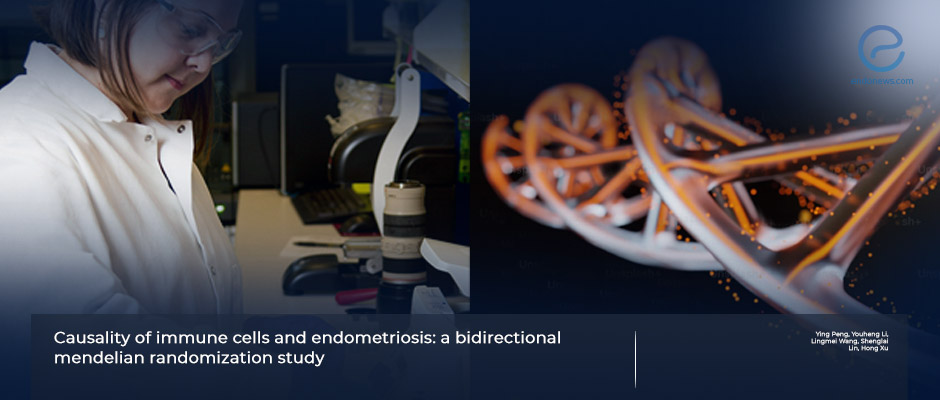Unraveling the Immune System's Role in Endometriosis
Nov 28, 2024
Evidence from Mendelian Randomization analysis reveals causal links into endometriosis pathogenesis
Key Points
Highlights:
- This study identifies distinct immune cell phenotypes with both protective and predisposing roles in endometriosis.
- It offers novel insights into immune dysregulation driving disease pathogenesis.
Importance:
- Understanding the systemic immune responses underlying endometriosis is critical for developing innovative treatment strategies.
- By employing Mendelian Randomization (MR), this study minimizes biases typical in observational research.
What’s done here:
- Researchers conducted a two-sample MR analysis to explore causal relationships between immune cell phenotypes and endometriosis risk.
- Sensitivity analyses and reverse MR evaluations were performed to validate findings and explore reciprocal effects of endometriosis on immune regulation.
Key results:
- Protective Effects: Certain immune cell phenotypes, including CD11c+ HLA-DR++ monocytes, CD25+ CD39+ CD4+ Tregs, and HLA-DR+ CD8bright T cells, were inversely associated with endometriosis risk.
- Predisposing Effects: Phenotypes such as CD24+ CD27+ B cells, CD25+ CD28+ CD4+ T cells, and CD33bright HLA-DR+ CD14− myeloid cells were linked to increased risk.
- Sensitivity analyses confirmed robustness, with no evidence of significant heterogeneity or horizontal pleiotropy.
- Reverse MR analysis suggested CD25 expression on CD39+ CD4+ T cells plays a protective role against endometriosis.
Strengths and Limitations:
- Strengths included rigorous methodology using Mendelian Randomization, comprehensive sensitivity analyses to confirm result robustness and large-scale, well-curated data from reliable sources.
- The limitations were the potential for horizontal pleiotropy, use of summary-level data limiting control over confounders, limited generalizability to non-European populations, and inability to differentiate anatomical sites of endometriosis.
Lay Summary
Endometriosis is often driven by complex immune system interactions. Dysregulated immune cells, including macrophages, neutrophils, and natural killer cells, play a significant role in promoting inflammation and lesion progression.
Researchers from China Led by Dr.Xu conducted a study to investigate the causal relationship between immune cell dynamics and endometriosis to uncover underlying mechanisms and identify potential biomarkers for improved diagnosis and treatment strategies. The article was published in the October 2024 issue of the journal BMC Women’s Health.
The authors used Mendelian Randomization (MR) analysis to explore the causal relationship between immune cell traits and endometriosis, leveraging genetic data from a large genome-wide association study (GWAS) cohort with over 8,000 cases and nearly 69,000 controls. MR employed stringent criteria for selecting genetic variants, advanced statistical methods, and a bidirectional approach to investigate both the impact of immune cells on endometriosis and how endometriosis may influence immune pathways.
The MR analysis revealed several immune cell phenotypes with significant associations with endometriosis. The results showed that specific immune cell subsets, such as CD11c+ HLA-DR ++ monocytes and certain T regulatory (Treg) cells, had protective associations, potentially reducing endometriosis risk. Conversely, immune phenotypes like CD24+CD27+ B cells and CD25+CD28+CD4+ T cells were linked to an increased risk, indicating a diverse role of immune regulation in disease development. It is discussed that the findings highlight the intricate and sometimes dual roles of immune cells, with subsets like Tregs showing both protective and predisposing effects depending on the specific phenotype. The authors also discuss that their study goes beyond localized tissue analysis by revealing systemic immune dysregulation, as demonstrated by the protective role of HLA-DR+ CD8bright T cells and the increased risk associated with elevated CD45 expression on NK cells. Additionally, the interplay of environmental factors, such as endocrine disruptors, with immune responses is noted, suggesting that immune phenotypes like CD11c+HLA-DR++ monocytes may mitigate some environmental triggers.
They conclude by saying that these results emphasize the intricate relationship between immune regulation and endometriosis, offering potential targets for therapeutic and diagnostic advancements, and further research is needed to identify biomarkers and develop targeted therapies.
Research Source: https://pubmed.ncbi.nlm.nih.gov/39462363/
endometriosis Mendelian Randomization immune system

